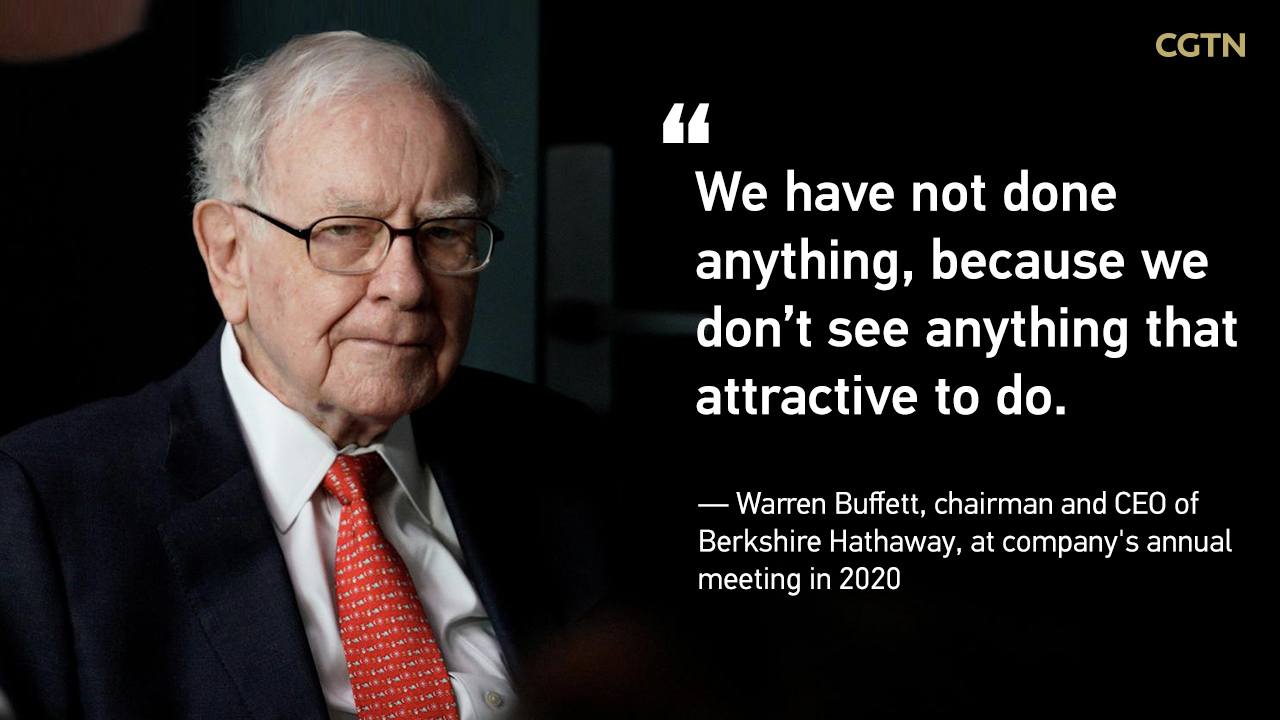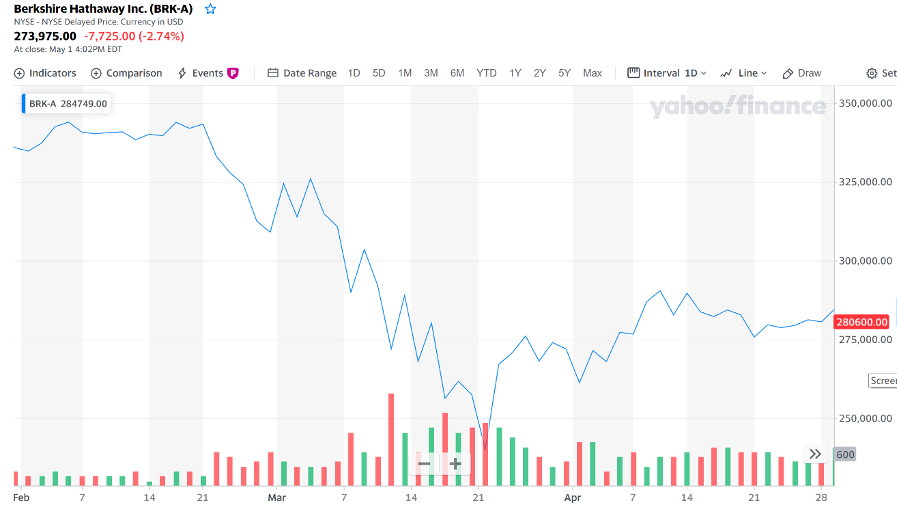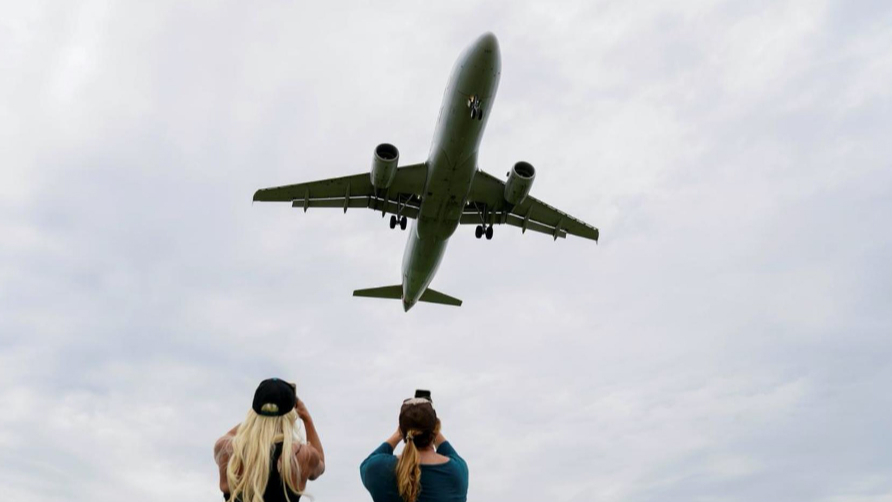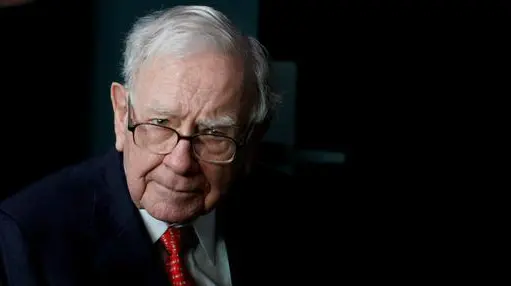Billionaire investor Warren Buffett, chairman of Berkshire Hathaway, talked about coronavirus and the economic outlook, and answered questions from investors at the company's first-ever virtual shareholders' meeting on Saturday.
The 89-year-old "Oracle of Omaha" was joined at the meeting with Greg Abel, vice chairman of Non-Insurance Operations. Abel is one of the potential successors to Buffett. Meanwhile, Buffett's 96-year-old right-hand man Charlie Munger was absent from this year's meeting.
The conglomerate's annual meeting, known as Woodstock for Capitalists, is typically a mecca for investors. Like many other events, the annual pilgrimage had to go online for the first time due to the coronavirus pandemic.
Here is a recap of Buffett's comments at the annual meeting.
'Never bet against America'
Buffett is generally optimistic about the U.S.' economic future. "Never bet against America," he said at the start of the meeting, however warning that the possibilities "are still extraordinarily wide" given the coronavirus crisis.
The billionaire admitted that "we haven't faced anything that quite resembles this problem" and the fallout from coronavirus is "still hard to evaluate."
Economic activities in the U.S. plunged between January and March, with GDP contracting by 4.8 percent, thebiggest downturnsince the 2008 financial crisis. About 30 million Americans have filed for unemployment benefits over the past six weeks.
"Never bet against America and that in my view is as true today at it was in 1789, and even was true during the Civil War and the depths of the Depression," he said.
'We don't see anything attractive'
The world is waiting and watching whether Buffett has any plans to buy stock in some of America's most troubled companies. However, the billionaire said he hasn't seen anything attractive yet.

During the 2008 financial crisis, he used previous price drops to buy companies at a discount or take partial ownership of companies, such as Bank of America and Goldman Sachs.
"In 2008 and 2009, our economic train went off the tracks, and there were some reasons why the roadbed was weak in terms of the banks," Buffett noted. "This time we just pulled the train off the tracks and put it on a siding."
$130 billion in cash to do it again
Buffett also allowed Berkshire's cash stake to rise to a record 137.3 billion U.S. dollars from 128 billion U.S. dollars at the end of 2019.
That reflected the 89-year-old billionaire's inability to make large, "elephant" size acquisitions for his conglomerate, and caution in buying stocks.
Berkshire said it bought only a net 1.8 billion U.S. dollars of stocks in the first quarter. It also said it repurchased 1.7 billion U.S. dollars of its own stock, but that was less than the figure in the preceding quarter.
$50 billion net loss
Buffett's Berkshire is hit hard by the coronavirus pandemic, posting a record net loss of nearly 50 billion U.S. dollars in the first quarter on Saturday. Performance is suffering in several major operating businesses.
The company's quarterly net loss was 49.75 billion U.S. dollars, or 30,653 U.S. dollars per Class A share, reflecting 54.52 billion U.S. dollars of losses on stock and other investments. Net earnings were 21.66 billion U.S. dollars, or 13,209 U.S. dollars per share, a year earlier.
Its stock price has fallen 19 percent in 2020, compared with a 12-percent drop in the Standard Poor's 500, despite Buffett's prediction that Berkshire would outperform in down markets.

/Yahoo Finance
In the first quarter, many Berkshire stock investments fared worse than the SP, including American Express, Bank of America, Wells Fargo and the four airlines.
Falling stocks also caused a pre-tax lossof 1.39 billion U.S. dollars on derivatives contracts, where Berkshire is betting stock prices will rise over the long haul.
A 'mistake' to invest in airlines
Berkshire sold its entire stakes in the four largest U.S. airlines in April, as Buffett said at the meeting that he made an "understandable mistake," and "the world has changed" for the aviation industry.
The conglomerate had held sizeable positions in the airlines, including an 11-percent stake in Delta Air Lines, 10 percent of American Airlines, 10 percent of Southwest Airlines and nine percent of United Airlines at the end of 2019, according to its annual report and company filings.
The company was one of the largest individual holders with investment around seven or eight billion U.S. dollars in the four airlines, stocks of which have been hard hit by the near collapse U.S. travel demand that has fallen by about 95 percent amid the coronavirus pandemic.

Flight attendants photograph a plane landing at Reagan National Airport during the coronavirus crisis while on a layover in Washington, U.S., April 29, 2020. /Reuters
"We made that decision in terms of the airline business. We took money out of the business basically even at a substantial loss," Buffett said.
Who's next at Berkshire?
There has been much speculation about what will happen when Buffett and his lifetime partner Munger step down.
Explaining why Munger did not appear at the annual meeting, Buffett said, "Charlieat 96 is really in fineshape." He added Munger is utilizing Zoom to hold virtual meetings every day, and will be back next year.
Changes don't appear at the top, however, the appointments of Abel and Ajit Jain as vice chairmen are said to be part of the transition in leadership.
Abel said at the meeting that he doesn't see the company's culture changing whenever Buffett and Munger leave. Jain, vice chairman overseeing Berkshire's insurance businesses, didn't attend the meeting either.
(With inputs from agencies)
 简体中文
简体中文

